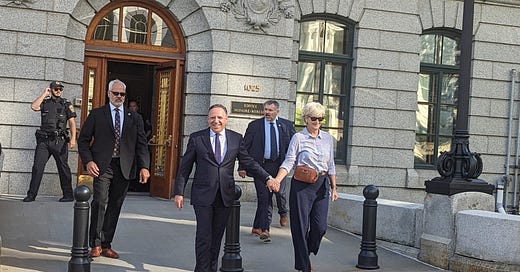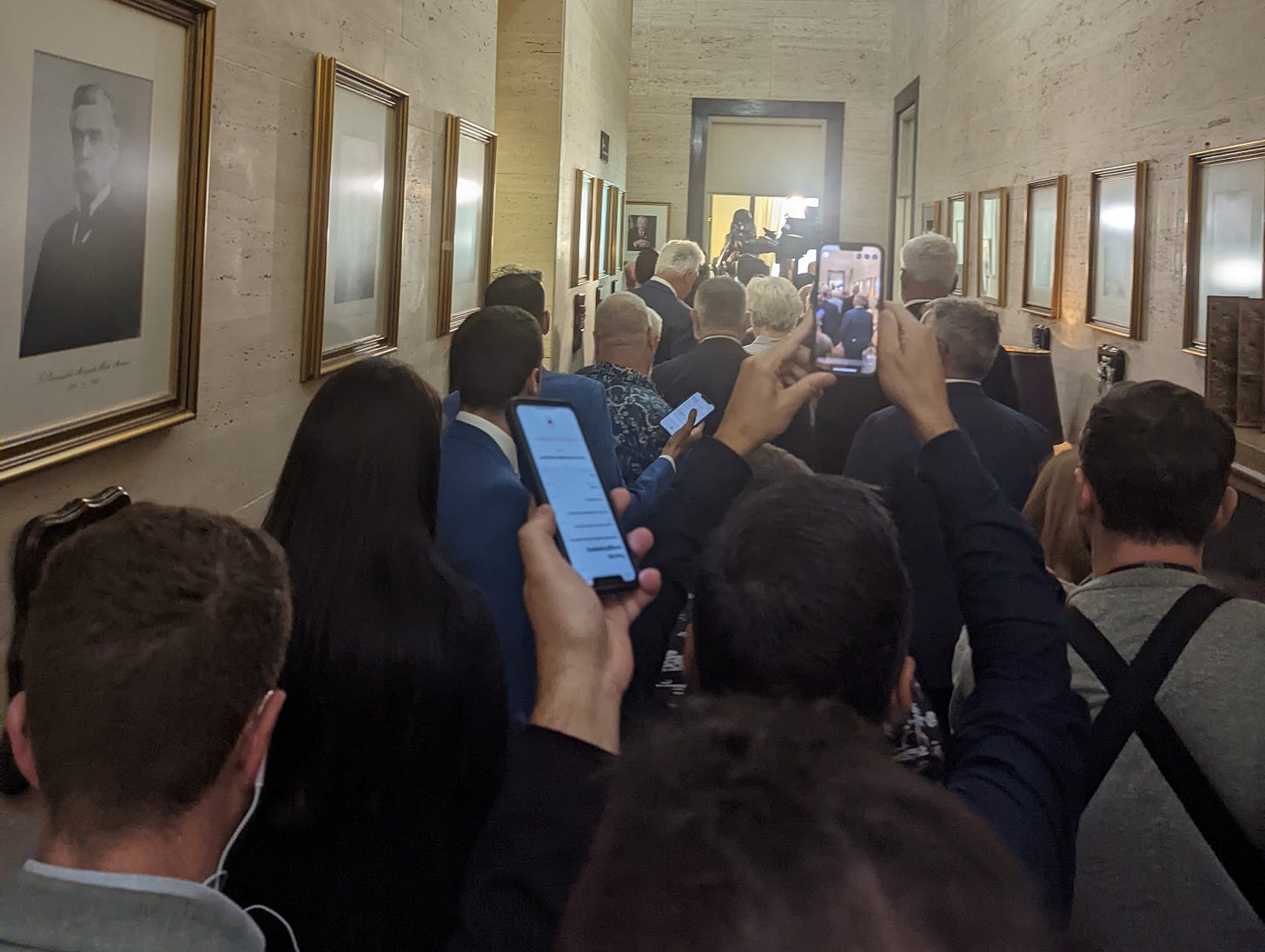“I don’t want anyone getting hurt,” François Legault said as he crossed the Rue des Parlementaires, behind Quebec City’s National Assembly building, to visit the Lieutenant Governor. He was nervous for the tight knot of reporters and cameras around him, some walking backwards. And maybe for himself, as he began his first campaign for re-election as Quebec’s premier.
They do things differently in Quebec City. In Ottawa on the first day of an election, reporters watch an incumbent Prime Minister walk into Rideau Hall, wait for an hour or so while mysterious things happen inside, and then scrum him on his way out. Here I was amazed to follow Legault, his wife Isabelle Brais, and a bunch of my Quebec City colleagues into the elegant office building where Lieutenant-Governor J. Michel Doyon works. On the way to the meeting, I flashed uncomfortably on a key scene from Jordan Peele’s movie Nope:
After a private meeting lasting only a few minutes, Legault and Doyon came out so Legault could watch the LG sign the decrees dissolving the National Assembly and setting an election for Oct. 3.
It will be a big surprise if Legault doesn’t win. His Coalition Avenir Québec (CAQ) is up more than 20 points over any opposition party, and there are four of them clumped together, doing a better job of getting in one another’s way than of making real trouble for him.
So I was surprised how nervous he seemed in the day’s early innings. Two things might explain it. This is his fourth campaign. He lost twice, in 2012 and 2014, after building this centre-right, medium-nationalist party in 2011. So he knows what dashed hope feels like. And Legault can be both an energetic and an approximate speaker. If there’s one thing everyone knows about him, it’s that he’s his own worst enemy. I mean, the second question in the day’s first press availability was, “Do you risk being your own worst enemy?”
He talked about his foot-in-mouth tendency a fair bit, spontaneously, before offering a demonstration.
I’m able to spend the week on Legault’s campaign bus because many readers of this newsletter have supported it by buying paid subscriptions. This post is free to read and share, but if you want to offer your own support, consider becoming a paying subscriber by clicking right here:
“I’m not perfect,” he told a crowd of supporters as he stood in front of several candidates at the Montmorency Falls outside Quebec City. “You’ve seen. I sometimes make mistakes. And when that happens, you don’t try to press ahead out of pride. You have to be humble. And if there’s one thing the pandemic showed me, it’s to be humble and change course when you get more information, to change course as you listen to the population.”
He has had to do a lot of changing course. People died faster in Quebec long-term care homes, in a few weeks at the beginning of the pandemic, than anywhere else in Canada. A pre-election poll shows Quebecers still view the episode as one of Legault’s low points. But his overall management of COVID remains his strongest issue in the same poll. And he’s so comfortable with his health-care record that he brought his health minister, Christian Dubé, to Saguenay-Lac-St.-Jean, three hours’ drive north of Dubé’s riding, for a rally to close the campaign’s first day. I offer no explanation for this. You see surprising things in politics.
Legault leaned heavily on some good economic news for much of his pitch. The gap between real GDP per capita in Ontario and Quebec has shrunk from 16% to 13% since 2017, he said. That means Quebec’s economy is growing faster than Ontario’s. “Who do you want to manage the economy in the next four years? Which economic team do you trust the most?”
Then Legault started doing a little thing he repeated throughout the day. “I hear the oppositions giving big speeches” about environmental policy, he said. “But that’s just about all they do, the oppositions — big speeches…. What are the four oppositions proposing? We don’t know. We don’t know.”
Making “opposition” a plural noun sounds as odd in French as in English. He kept doing it. Who do you trust, he asked, to run health care? “Do you trust the oppositions, who are pulling in every direction?” Those nutty oppositions. It’s almost as though they were four separate parties.
The CAQ leader is clearly engaged in some strategic lumping-together. In a crowded field, with five parties vying for advantage, he wants the crowded-ness to be part of his message. In the days leading up to this campaign launch, several news organizations announced proudly they will be covering all five parties’ campaigns for the duration. That’s a big financial commitment. But it also ensures crowded newscasts with a lot of potential for confusion. Legault’s game is to say: There’s us, and then there’s all these little parties you can’t tell apart.
Pursuing this goal led to his worst opening headlines. A reporter told Legault that Dominique Anglade, the leader of the Liberals, has been teasing Legault about one of his earlier gaffes, when he called the province-wide labour shortage “a hell of a good-news story.” Apparently she’s been daring him to do it again.
He kind of did. Unemployment in Quebec in July was the third-lowest in Canada, he said. “So how can that lady say Quebec’s economy isn’t going well?” (“Comment cette madame peut-elle dire que l’économie du Québec va pas bien?”)
Well, that’s a little weird, calling a rival cette madame, as though using pincers to hold her at a distance. A reporter asked about the impersonal choice of terminology. Legault said he was just trying to avoid personalizing things.
“At least something’s happening,” one of the reporters on the CAQ bus said later.
“Downtown, they’re calling it ‘madame-gate,’” another told me. On the Twitter, Anglade could hardly contain her glee.
I doubt we’ll be talking about cette madame by Wednesday. This was a test, it was only a test, of the Emergency Gaffe-Cast System. But no wonder Legault is nervous. Unless he stumbles, there’s no story. And a bus full of reporters is listening to everything he says.






Housekeeping note: If anyone's wondering, in slightly panicky fashion, "Is he going to write about nothing but the Quebec election for the next five weeks?" the answer is "No." I'll keep up this newsletter's fondness for changing the subject.
Another good piece.
I have a weird feeling about this one.